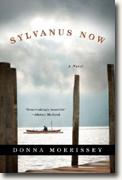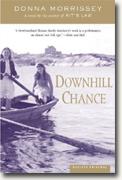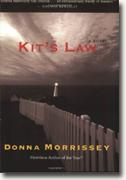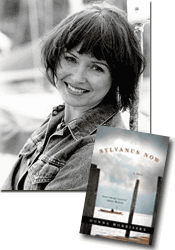An Interview with
Donna Morrissey
Interviewer Luan Gaines: What was your inspiration for Sylvanus Now?
Donna Morrissey: I wanted to personalize the destruction of a way of life, bring a soul into conflict with the quotas and numbers thrown out by national and international governments whilst visiting destruction upon the largest fishing grounds in the world, the Grand Banks of Newfoundland.
Sylvanus Now addresses an epic battle on two fronts, the economic and the spiritual. How do the extremes of Sylvanus and Adelaide's lives affect their more personal struggles?
The extremities of their epic struggles bring them into conflict with their daily lives, pitting one against the other, forcing them to learn the other's world, and, perhaps, learn to love each other as they learn to love themselves.
Sylvanus could not be more different that Adelaide, at least in the beginning of the novel. How does his self-assurance and easy nature affect his pursuit of the very particular Adelaide?
Without wanting to Adelaide is drawn to Sylvanus's easy going manner, his love of the sea, the cliffs, the meadow. She, too, is a lover of the natural world - at least, some parts of it - and inexplicably, Sylvanus becomes woven into the grandeur of the land he offers her.
At first glance, Adelaide is arrogant; but given her environment, a desire to escape her squalling siblings is certainly understandable. How does Adelaide's attitude shield her from the harsh realities of her daily existence?
If left alone, Adelaide's was a self serving nature. Sylvanus allowed her that, aided it by keeping her ignorant of his diminishing cod catches, the hardships imposed by foreign over fishing, the struggle to keep his puncheons full. First, through her arrogance, and then, through her self-imposed exile, she removed herself further and further from Syllie's struggles. And given her indifference to her few neighbors, little of the pressure crushing her small outport made its way to her.
 When Adelaide sees Sylvanus in his suit, she has a moment of euphoria, salvation on the horizon. Afterwards, knowing him for a fisherman, why does Adelaide accompany Sylvanus to Cooney Arm?
When Adelaide sees Sylvanus in his suit, she has a moment of euphoria, salvation on the horizon. Afterwards, knowing him for a fisherman, why does Adelaide accompany Sylvanus to Cooney Arm?
Adelaide - at first - accompanied Sylvanus to Cooney Arm for one simple reason, to escape the boredom and drudgery of her home life and squalling siblings.
I expected Adelaide to run off and leave her husband; she seems a perfect candidate for the role of dissatisfied wife. But you avoided this obvious ploy, plotting a more complicated course for this character. Was this your intention when you began the novel or did Adelaide evolve in this direction? Please explain.
During those early days in Newfoundland society, leaving your husband wasn't a solution. Where would one go? The island was very isolated with few roads leading out, and then to leave would take money, skills, connections in some larger town. Adelaide had none. And in those days, separation, divorce seldom took place. The one possible solution was for Adelaide to confront herself, her darker side, to go through that dark night, to become a full person in wake of her environment.
Why does Sylvanus' mother, Eva, make such an effort to befriend Adelaide, shielding the young woman from the sharp tongues of the other daughters-in-law?
Eva understood Adelaide. She saw in Adelaide her son who drowned. She knew her son's longing for something the outports couldn't offer. She laments that he drowned without finding the courage to leave, to find that fuller life. She stands guard over Adelaide's solitude, waiting, possibly knowing, the darkness Adelaide would have to combat when grief strikes, a grief that Eva knows only too well.
Eva is a significant character in the novel, a woman who sacrifices her own needs for her sons. How does Eva's relationship with Adelaide help guide the newlywed through the treacherous territory of grief and depression?
Eva gives Adelaide permission to enter her state of grief, to be with it. Upon the cliffs Adelaide curls into a womb, depriving herself of her senses, until Eva sounds the bell. Then through working in the garden with the old woman, she learns to feel again, to see things grow beneath her hands, to feel contained in the earth that she seeds.
Sylvanus builds one wall of their house without windows in an effort to isolate his wife from the ugliness of his occupation. How significant is this windowless wall and how does it represent their marriage? Please explain.
Whilst in the beginning Sylvanus thinks it's a fine thing to have the wall with no window, he quickly learns that it is wall between him and Adelaide. It prevents her from seeing who he truly is, prevents her from becoming integrated into the outport life. As with that windowless wall, Adelaide withdraws inside a closed part of herself, a room where Sylvanus is unable to enter, unable to see, to understand that hidden part of his wife's nature.
Life is harsh on the Newfoundland coast, the harrowing, but satisfying occupation of the fishermen linking them to the ocean that feeds their families. How do the changes in the industry affect the entire social construct of these people's lives?
Their lives revolved around the seasons, the cycle of the fish. They worked together, fisherman alongside fisherman, the women with their gardens. Roles were clearly defined, truly a old world culture. When the fishing industry became more modernized, and eventually worn down, it cast people from their work, and oftentimes, their homes. Large fish-plants were erected, small outports were re-located to build larger 'growth centers'. Fishermen were taken from their independent means of fishing to work in fish plants, sou'westers and oil skins were replaced by rubber aprons and hair nets. Eventually, as the fishing grounds became depleted, the fish plants shut down, and whole communities were left with no means of employment, and no fish in the ocean to start anew. Thousands of fishermen were forced from their homes into cities to find work in factories, whilst the old remained behind to lament the loss of their sons, their homes.
 In those pivotal years from the 1950s to the 1960s, the entire fishing industry is altered by the use of gill nets, fishing liners and processing factories, individuals shuffled aside by looming corporate ownership. Their most vital link to nature threatened, how do these families cope with a radically changed and unpredictable future?
In those pivotal years from the 1950s to the 1960s, the entire fishing industry is altered by the use of gill nets, fishing liners and processing factories, individuals shuffled aside by looming corporate ownership. Their most vital link to nature threatened, how do these families cope with a radically changed and unpredictable future?
Always, when a culture is in a state of change, there are those who can't, or, who won't, change with it. Sylvanus Now is such a man. He loves fishing for a living, he loves his boat, and the sea rocking him like a coddling old mother. And he hates change, he fights it, he curses it. But there are his brothers who welcome change, see it as opportunity to gain better lives. And there are the old, who, like Eva, Syllie's mother, have too much invested in the old way to ever leave it. They are each forced to make decisions that aren't necessarily in keeping with the forces around them, or the ones they love. Henceforth there is much conflict amongst brothers, amongst sisters, and others.
Sylvanus refuses to concede to progress, profoundly disturbed by the new methods of fishing. In his powerlessness Sylvanus rages. Does his struggle against the inevitable impact his view of the world and his place in it?
Undoubtedly Sylvanus develops a deep disrespect for those huge mega systems that industrialize a way of life, a culture, rapes it from its source, and then abandons it. It is his belief that some things ought to remain the same, like the rocks and trees around us; that yes, there must be change, but all change isn't necessarily good.
Adelaide has looked to religion for comfort for many years. In the extremes of grief, does her faith fail her?
It is Adelaide who fails her religion in the extremes of her grief. When she finds herself pondering whether there is a God she falls into a deeper depression. All of her life she has simply accepted God, had held sacred her moments of prayer in a quiet church, before the beauty of the Christ child. When she looses her babies, she loses faith in the Christ child as well, which destroys her hope, leaving her in deeper darkness. It is only true finding hope again that she rekindles her passion for God.
Adelaide and Sylvanus, so dissimilar in the beginning of the novel, appear more alike psychologically as the story evolves, each isolated in the extreme. How does this isolation threaten their ability to function in the marriage and in a changing environment?
They become so lost in their private worlds that they leave no path for the other to follow. They find no comfort, no understanding of each other for their personal battles. And they both start internalizing what they perceive as rejection of the other. As their external world closes in they are forced into confrontation with the other.
The natural environment adds emotional depth to the story, the roiling sea as integral as any character. Does Sylvanus and Adelaide's small drama, played out against nature's implacability, assume more significance in this context?
Adelaide saw Sylvanus as one who was hewn by the wind and sea, his bandied knees, his curled hands, his squinty eyes. And in time Adelaide herself became entrenched in her garden. They both found a major part of themselves in the sea that they fished, in the land they toiled. And it is the forces of nature that propels their character along. Truly, this story couldn't exist without the natural environment. Yet, both Sylvanus and Adelaide are strong characters, and it is through their eyes, their experiences thattheir environment comes alive.
In harnessing the environment to harvest its goods, the bounty is often destroyed without replenishing the source. Can you speak to this aspect of the small fisherman's dilemma and why these impending changes are so profound?
It is most frustrating for the small fishermen to see the ocean's bounty being destroyed, for he sees his life being destroyed alongside of it. He has gathered much knowledge about the fish, their cycles - since John the Baptist he has been gathering and passing along information about the fish and the sea. Yet, in the face of scientist, biologist, governments, his knowledge is considered folk lore, non-scientific. They, the smallfishermen, saw in the buildup of the offshore fishing fleets the germ of its own demise long before it became fact. Yet, they were never listened to.
 How does your intimate knowledge of the area and its lore inform your writing?
How does your intimate knowledge of the area and its lore inform your writing?
One of my earliest memories is waking in the morning to the hubble of my grandfathers, my uncles voices as they gathered around their fishing boats, preparing for the morning's fishing. Sometimes they'd take us youngsters in the boat with them, and it would be thrilling to watch them do their dance with the sea, to be without fear of the wind or the lop, or a whale breaching an arm's length, alongside. It allowed me to see them in their most intimate moments with the sea, themselves, standing so tall in their oilskins,Their sou'westers, all black against the sky. Big, brave men, they were, and I learned them well.
What would you like readers to take away from Sylvanus Now?
I'd like most readers to take with them a sense of how a character evolves through change, how change forces us to confront our deeper, inner selves, and, as importantly, how helpless we can be against corporate and political agendas.
Are you working on another novel? If so, can you share something about it with us?
I'm currently working on another novel that's keeping me very much in the dark as to what it's really about...
Any advice for would-be writers?
Read as much as can, whatever you can, and write whenever you can, as much as you can.
Donna Morrissey is the award-winning author of Kitís Law and Downhill Chance, and the screenplay Clothesline Patch. She grew up in the Beaches, a small fishing port in Newfoundland, and now lives in Halifax, Nova Scotia.
Contributing reviewer Luan Gaines interviewed
Donna Morrissey, author of Sylvanus Now (see accompanying review), about his book via email for curledup.com. Luan Gaines/2005.




